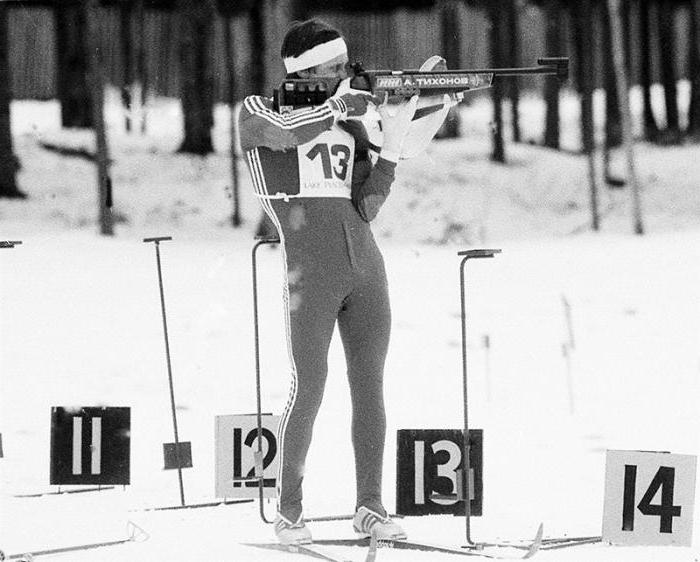article by Nicola Pucci
Reading Alexander Tikhonov’s initial biography is truly shocking. As soon as he was born, he was diagnosed with a congenital heart disease. At the age of five, he fell into a cauldron of boiling water, was seriously burned and was forced to spend a year in hospital. At 22 years old in the dining car of a train, he risks his life by neutralizing a dangerous criminal who has just inflicted 16 knife wounds on a man and a woman, being awarded theOrder of the Red Star. In short, when at 19 years old, after having shown excellent skills in cross-country skiing to the point of becoming national junior champion in the 10 and 15 km, a leg injury forces him into inactivity, he certainly doesn’t give up and fate, too often cruel to him, lends him a hand.
To recover from his injury, Tikhonov travels to the Estonian town of Otepää, where biathlon champions train. Aleksandr walks on crutches, he can’t move, but as luck would have it the senior coach of the Soviet team, Aleksandr Privalov, approaches him and offers to shoot him with a rifle: “we went to the shooting range. Privalov’s rifle (2 meters high) was clearly too big for me, but with five shots I hit five targets. This is thanks to the love of hunting that my father instilled in me”. The die is cast. From that day in 1966, biathlon became the favorite competitive exercise of the boy from Uyskoyewhere he was born on 2 January 1947, and the future will give him sporting immortality.
It is obviously not easy to succeed in excelling in a discipline which in the USSR has many practitioners and a reasonable number of great champions. Tikhonov is thus diverted, above all, towards the group test of the relay, and since he is very fast and can shoot with a certain precision, he will almost always be used as the first member of the quartet. And if in 1967, in his first experience at the World Championships, he won silver in Altenberg behind the Norwegian relay team, from the following year, at the Grenoble Olympics, he begins to write his very personal story at the Games which places him among the greats of biathlon.
In France, Tikhonov makes his debut in the 20 km individual race, and second place behind the Norwegian Magnar Solberg, thanks to two errors at the shooting range, reveal his classand, as he has the opportunity to confirm three days when, in the 4×7.5 km, he launches the USSR quartet, also composed of Nikolai Pusanov, Viktor Mamatov and Vladimir Gundartsev, who finally puts the gold medal around his neck distancing Norway itself by almost two minutes.
In the four-year period leading up to the Japanese edition of the Sapporo Olympics, Tikhonov rose to the rank of authentic dominator of the world biathlon scene, achieving a double in the only two races included in the program, 20 km and 4×7.5 km relay, at the world championships of Zakopane 1969 and Ostersund 1970settling instead for gold and silver (surpassed by the East German Dieter Speer) at the 1971 World Championships in Hämeenlinna. And at the 1972 Olympics, after the bitter fourth place in the individual competition, penalized by three errors in the first shooting session and finishing with 21 second from the bronze of the Swede Lars-Goran Arwidson, together with Rinnat Safin, Ivan Biakov and Viktor Mamatov repeats the success of four years earlier in Grenoble in a relaydespite the breaking of a ski which forces him to “Pass the witness” only in ninth position.
Tikhonov’s career adds one success after another, as evidenced by his palmares at the World Championships which adds two more golds in Lake Placid 1973, a gold and a silver in the relay in Minsk 1974 and Anterselva 1975, a gold in the 10 km sprint also in Anterselva 1976, two golds in the relay and in the sprint 10 km and a silver in the 20 km at Lillehammer 1977, and a silver in the 20 km (which will earn him the ticket for his fourth presence at the Games) and a bronze in the relay at Ruhpolding 1979, his last performance in the world championships. In the meantime, in Innsbruck 1976, Aleksandr takes part in his third Olympics, and it’s time to update the record book.
In Tyrol, Tikhonov did not go beyond fifth place in the 20 km individual race, penalized by 6 errors in the last session at the shooting range which nullified the 5 minute (!!!) advantage with which he was leading the race, relegating also behind the blue Willie Bertin, but on 13 February 1976, the day of the relay, this time lined up as the fourth participant, he sealed the performance of his teammates, who for the occasion were Aleksandr Elizarov, Ivan Biakov and Nikolai Kruglov (the winner of the 10 km), putting the third consecutive gold medal in relaytriumphing almost 4 minutes ahead of Finland.
For poker to be complete just wait four years and the American edition of Lake Placid, in 1980, when Tikhonov, chosen as standard-bearer of the USSRwas also not fielded in the individual 20 km race because he was weakened by a cold earning his place as second relay runner for the 4×7.5 kmnot before having competed in the 10 km sprint, finishing in ninth place.
On February 22, 1980 Aleksandr Tikhonov, second in the field after taking over from Vladimir Alikin, finds himself having to battle with the East German Klaus Siebert, moving into first position and entrusting Vladimir Barnashov and Anatoly Alyabyev with the task of completing the mission, 54 seconds better of the East German quartet.
Aleksander Tikhonov becomes the first biathlete in history to win a poker at the Olympicsand whether to improve that record we will have to wait for a certain Ole Einar Bjørndalen… beh, tell me if we’re not talking about a great one.
